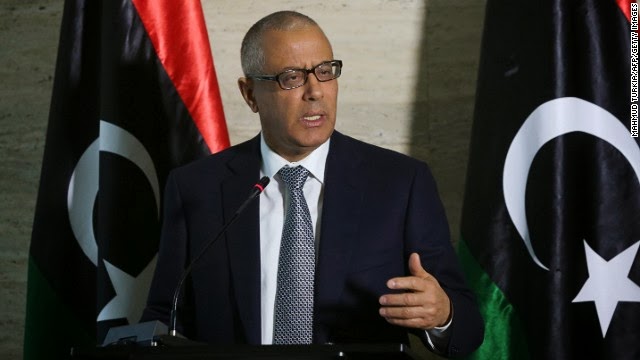Uncategorized
Libya Prime Minister out of office
Libya’s parliament voted Prime Minister
Ali Zeidan out of office on Tuesday after months of political infighting
that has crippled the North African country.
The vote of no-confidence came after rebels in eastern Libya said a
tanker loaded with oil from a port under their control escaped a naval
blockade and moved into international waters.
The Libyan government said late on Monday that it had taken control
of the North Korean-flagged tanker, Morning Glory, as it tried to
leave the Al-Sidra port in eastern Libya, and after having briefly
exchanged fire with rebels.
However, in a sign of the chaos and conflicting information typical for
Libya, the rebels rejected the assertion.
Oil production, Libya’s economic lifeline, has slowed to a trickle since
the summer as armed protesters have seized oil ports and fields to
press political and financial demands.
They are seeking a greater share of the country’s oil revenue, as well
as autonomy for eastern Libya.
The conflict over oil wealth is stoking fears Libya may slide deeper
into chaos as the fragile government fails to rein in the armed brigades
that helped oust Moammar Gadhafi in 2011 but now do as they please.
The removal of Zeidan, a liberal weakened for months by infighting
with Islamists, deepens the turmoil in the country of 6 million people.
However, a crowd outside the Tripoli hotel where lawmakers had
met to vote could be seen cheering as news broke of his dismissal,
images broadcast on Libyan television showed.
“We have nothing personal against Zeidan, but his government has
failed the people,” one man said.
Defense minister interim premier
Zeidan will be replaced temporarily by Defense Minister Abdallah
al-Thinni, who will hold the position of premier for two weeks until
a replacement is picked. He was sworn in after the vote.
Libyan state news agency LANA said the General National Congress
had passed the dismissal with 124 votes; it was not immediately clear
how many of the nearly 200 lawmakers were present during the
session.
Previous attempts to bring down Zeidan, who has headed the
government since November 2012, had failed to win the required
majority.
Zeidan was himself briefly abducted by former rebel militia in the
heart of the capital Tripoli last year.
He had for months been facing rising opposition from Islamist parties
and the wider public, blaming his government for the rising violence in
the vast desert nation. corruption and a multitude of other problems
Libya is facing in its bumpy transition.
At the same time, anger has been mounting against the GNC after it
extended its term in office, which was supposed to end on February 7.
Angry protesters earlier this month stormed the GNC headquarters
— ransacking it, assaulting some members and wounding two others
while shooting.
“Nationwide demonstrations have taken place since early February
against the continued tenure of the General National Congress,” the
United Nations’ special envoy to Libya, Tarek Mitri, told the U.N.
Security Council on Monday. “Strong resentment and animosity has
grown between the two main, though not homogeneous, camps. Libya
faces the risk of embarking on a new trajectory of unprecedented
violence.”
Slumping oil output
Tripoli had entrusted militia leader Ibrahim Jadran to safeguard
some crucial oil ports. But eight months ago, he and his men seized
them, blocked oil exports, and demanded more autonomy and shared
revenue for his eastern region.
The blockades have led to a slump in crude production — with output
said to be around 250,000 barrels per day, down from 1.6 million.
Libya’s government has threatened force against ships that entered the
rebel-controlled oil ports on several occasions. But despite ultimatums
to such ships, those deadlines came and went with no action from
Libyan officials.
In this case, Zeidan’s government had threatened armed action, even
an air strike, to prevent the Morning Glory tanker getting away with
the oil bought from the rebels’ self-declared autonomous regional
government without the authorization of the state oil body, the
National Oil Corporation.
It is unclear who actually owns the vessel.
Speaking as Thinni was sworn in, GNC President Nuri Abu
Sahmain told lawmakers: “This period is definitely hard, but we will
work together and provide all we can based on our experience … we
wish him all the luck.”





